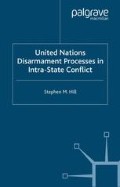Abstract
With the creation of the United Nations Operation in Mozambique (ONUMOZ) in December 1992, the UN had established its thirteenth peacekeeping operation of the post-Cold War era. Thus, in only four years the UN had equaled the number of operations it had conducted during the previous 40. However, the optimism that had been generated in the initial post-Cold War period was now beginning to waver. As described in the previous chapter, democratic elections in Angola had been followed by a return to war and many analysts were blaming the UN’s failure to disarm UNITA for the ease with which it had resumed. At the same time, the refusal of the Khmer Rouge to disarm and participate in elections in Cambodia was placing that country’s whole peace process in jeopardy. It was to be in this climate of dejection and uncertainty that the peace negotiations for Mozambique were to conclude.
Access this chapter
Tax calculation will be finalised at checkout
Purchases are for personal use only
Preview
Unable to display preview. Download preview PDF.
Notes
A. Vines, RENAMO: From Terrorism to Democracy in Mozambique (Villiers Publications, 1996) p. 120.
V. Brittain, ‘Rebel Group Strangles Quarter of Mozambique’, The Guardian, 3 August 1994.
L. Elliot, ‘Debts Fetter World’s Police Force’, The Guardian, 13 May 1994.
D.J. Puchala, ‘Outsiders, Insiders and UN Reform’, Washington Quarterly, Vol. 17, No. 4 (1994) p. 168.
F. Bridgland, ‘Shoestring Peace About to Snap’, Sunday Telegraph, 21 February 1993.
C. Alden, ‘The UN and the Resolution of Conflict in Mozambique’, Journal of Modern African Studies, Vol. 33, No. 1, 114–15.
M. Hamlyn, ‘1’oll Raises Mozambican Fears’, The Times, 21 October 1994.
C. Alden, ‘Swords into Ploughshares? The UN and Demilitarization in Mozambique’, International Peacekeeping, Vol. 2, No. 2 (1995) pp. 179–80.
R.B. Oakley, M.J. Dziedzic and E.M. Goldberg (eds), Policing the New World Disorder: Peace Operations and Public Security (Washington D.C.: National Defense University Press, 1998) p. 166.
C. Crawford, ‘Mozambique’s Fragile Peace Process Risks Too Easy Derailment’, Financial Times, 25 January 1994.
D. Beresford, ‘Final Lap for UN’s Man in Maputo’, The Guardian, 26 October 1994.
B.F. Walter, ‘Designing Transitions from Civil War’, in B.F. Walter and J. Snyder (eds), Civil Wars, Insecurity and Intervention (New York: Columbia University Press, 1999) p. 57.
T. Kurzidem, ‘ONUMOZ- How To Make A Successful Peacekeeping Operation’, International Peacekeeping, Vol. 1, No. 4 (1994) p. 133.
Author information
Authors and Affiliations
Copyright information
© 2005 Stephen M. Hill
About this chapter
Cite this chapter
Hill, S.M. (2005). Mozambique 1992–1994. In: United Nations Disarmament Processes in Intra-State Conflict. Southampton Studies in International Policy. Palgrave Macmillan, London. https://doi.org/10.1057/9780230502963_3
Download citation
DOI: https://doi.org/10.1057/9780230502963_3
Publisher Name: Palgrave Macmillan, London
Print ISBN: 978-1-349-42655-3
Online ISBN: 978-0-230-50296-3
eBook Packages: Palgrave Political & Intern. Studies CollectionPolitical Science and International Studies (R0)

